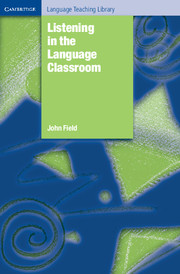Book contents
- Frontmatter
- Contents
- Dedication
- Acknowledgements
- Introduction
- Part I Background
- 1 Listening then and now
- 2 The comprehension approach: pluses and minuses
- Part II Rethinking the comprehension approach
- Part III Process, not product
- Part IV A process view of listening
- Part V The challenge of the real world
- Part VI Conclusion
- Appendices
- Glossary of listening-related terms
- References
- Index
- References
2 - The comprehension approach: pluses and minuses
Published online by Cambridge University Press: 01 October 2009
- Frontmatter
- Contents
- Dedication
- Acknowledgements
- Introduction
- Part I Background
- 1 Listening then and now
- 2 The comprehension approach: pluses and minuses
- Part II Rethinking the comprehension approach
- Part III Process, not product
- Part IV A process view of listening
- Part V The challenge of the real world
- Part VI Conclusion
- Appendices
- Glossary of listening-related terms
- References
- Index
- References
Summary
He ne'er presumed to make an error clearer;
In short, there never was a better hearer.
Byron (1788–1824), British poet, Don JuanIn Chapter 1, we reviewed the changes that have taken place in the methodology of the listening lesson and the rationale behind them. The changes have been extensive, but it can be argued that they have not been extensive enough. We have made adjustments to the format of the listening lesson; but we have not addressed in any fundamental way the question of what it is that we aim to achieve in teaching listening. Nor have we taken adequate account of recent insights from research into the nature of listening processes. One has to conclude that the current approach does not serve our purpose adequately – indeed it misleads us dangerously into believing that we have dealt with the listening problems of our learners when we may barely have touched the surface.
What has survived intact from the original approach shown in Table 1.1 is a received view that the best way of developing listening skills entails presenting learners with a recorded passage of about three minutes, then checking their understanding of the passage by means of a comprehension exercise. If a right answer is given (at least by the more vocal members of the class), teachers assume that understanding has been achieved and move on. If a wrong answer is given, teachers replay the part of the text that has caused difficulty.
Information
- Type
- Chapter
- Information
- Listening in the Language Classroom , pp. 26 - 34Publisher: Cambridge University PressPrint publication year: 2009
